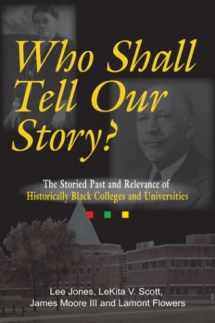
Who Shall Tell Our Story?: The Storied Past and Relevance of Historically Black Colleges and Universities
ISBN-13:
9781579220938
ISBN-10:
1579220932
Author:
Lee Jones, Lamont A. Flowers, LeKita V. Scott
Publication date:
2009
Publisher:
Stylus Publishing
Format:
Paperback
288 pages
FREE US shipping
Book details
ISBN-13:
9781579220938
ISBN-10:
1579220932
Author:
Lee Jones, Lamont A. Flowers, LeKita V. Scott
Publication date:
2009
Publisher:
Stylus Publishing
Format:
Paperback
288 pages
Summary
Who Shall Tell Our Story?: The Storied Past and Relevance of Historically Black Colleges and Universities (ISBN-13: 9781579220938 and ISBN-10: 1579220932), written by authors
Lee Jones, Lamont A. Flowers, LeKita V. Scott, was published by Stylus Publishing in 2009.
With an overall rating of 3.7 stars, it's a notable title among other
books. You can easily purchase or rent Who Shall Tell Our Story?: The Storied Past and Relevance of Historically Black Colleges and Universities (Paperback) from BooksRun,
along with many other new and used
books
and textbooks.
And, if you're looking to sell your copy, our current buyback offer is $0.45.
Description
This is a panoramic review and examination of Historically Black Colleges and Universities (HBCUs) and their place in American society. It also presents a brief analytical history of HBCUs, setting them in the context of the concurrent development of Predominantly White Institutions, and the widely disparate conditions under which HBCUs and Predominantly White Institutions have operated, and continue to do so. From the beginning one of the principal distinguishing characteristics of HBCUs has been their sources of funding. Even today they are heavily dependent on organizations such as the National Association for Equal Opportunity in Higher Education, the United Negro College Fund, and the Thurgood Marshall Scholarship Fund. Unable to tap the resources available to their majority counterparts, HBCUs have had to skimp on capital improvements, restrict scholarships and hold down salaries. This book looks at what initiatives have been taken, and explores what might be done, to help close the "great divide" This context makes the achievements of HBCUs all the more remarkable. The authors look at the lives and impact of influential alumni; at HBCUs’ record of producing over 80% of African American bachelor degrees--whose holders go on to account for 80% of African American Ph.D.’s--and explore the policies and practices that have led to these successes. The book includes new research on the impact of HBCUs on Black occupational status.The authors are not reticent in addressing the shortcomings of many HBCUs , or in acknowledging and presenting cases of mismanagement of staff and funds. The recognition of these realities and an assessment of the political and educational trends--including the negative climate for affirmative action--leads a conclusion that sets out the issues that HBCUs face and outlines leadership issues and policies to secure their future.


We would LOVE it if you could help us and other readers by reviewing the book
Book review

Congratulations! We have received your book review.
{user}
{createdAt}
by {truncated_author}


